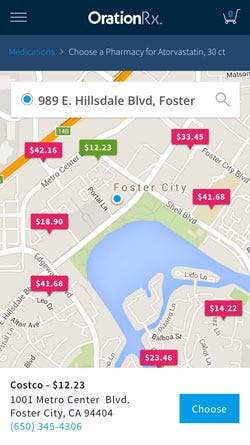Prescription Shopping without the Headache
Oration is taking on the pesky prescription process and striving to make it cheaper, more transparent, and simpler for patients to get their pills.
February 12, 2016

Oration is taking on the pesky prescription process and striving to make it cheaper, more transparent, and simpler for patients to get their pills.
Marie Thibault
The long lines at the drug store aren't the only pain point associated with prescriptions. Prices for those prescriptions can vary between pharmacies, making patients wonder why the drugstore near their gym is cheaper than the one by their home or by their work. The lack of clarity means some patients are paying more than they need to for their prescriptions.
|
Patients can view pharmacy locations, prices, and order their prescriptions through OrationRx. |
Oration, a four-year old company based in Foster City, CA, is starting to give patients a way to sort through the confusion. The company publicly debuted its OrationRx software solution in December 2015 to offer patients who receive health insurance through large self-insuring employers more information about their prescriptions, allowing them to select and order using the technology.
Oration CEO Pramod John, who was previously the vice president of strategy and innovation at McKesson, started Oration because he saw the need to address the "very large national social problem" of high drug prices. Why, he wondered, are prescription drugs more expensive in the United States even though it is one of the most competitive markets for nearly every other type of product?
"We came to the conclusion that the reason why Americans pay so much . . . is completely a supply side issue. Really, a lack of competition," John said during an interview in late January.
Unnecessary spending on prescription drug is a problem that has been acknowledged by Express Scripts, a large U.S. pharmacy benefit manager (PBM). In 2013, Express Scripts published research showing that "$93.1 billion could have been saved if patients would have used the most cost-effective and clinically appropriate pharmacies."
Employers already have contracts with PBMs for their employees' prescription drugs. Oration sells software which plugs in on top of any pharmacy benefit manager (PBM) contract and "automatically figures out all the optimizations for you as an employee and your family," John said.
"Our analytics engine automatically figures out . . . who is pricing in what ways, who has lower prices, who is charging at contract, who is selling below. And, we get data from external market sources that also give us data that's outside of your contract."
Although an employer's PBM might have a contracted rate for a drug, there still may be lower prices offered elsewhere, and Oration shows patients those prices and locations.
On the OrationRx user interface, patients can view all their prescriptions and health information in one place, as well as prescriptions for other family members. They can pull up a map that shows them the different pharmacies that offer their prescribed drug, as well as the price they will pay at each location. As an added bonus, any coupons are automatically added for the user's benefit.
John acknowledges that there are other prescription pricing transparency tools available, like GoodRx, but points out that Oration also gives patients the ability to order the prescriptions through OrationRx. With this, he believes the company makes the entire prescription process easy for the customer. He draws a comparison to Amazon: "Amazon wasn't successful because of price transparency. Amazon was successful because you could click on a button and something would happen."
The company has some well-known backers. In 2014, Oration raised $11.2 million in a Series A funding round that was led by DFJ Venture and included Google Ventures, Andreessen Horowitz, Chicago Ventures, Data Collective, Work-Bench, Arsenal Venture Partners, TiE Angels, and individuals.
Oration signed its first customer in 2014 and its client base now includes RR Donnelley, ADM, and Workday, among others. John explained that once an employer signs on with Oration, their employees can start using the system as soon as within 30 days. He estimated that the effort needed from some customers has taken as little as eight hours.
Clients pay a software licensing fee, but John explains that this is "backstopped" by whether the employer saves money or not. "Technically, if you don't save a dollar, we don't get paid," he said. This risk-sharing, savings-sharing model puts Oration right on trend with large medtech players.
In an online video from Oration Videos, RR Donnelley chief human resources officer Tom Carroll described OrationRx. "Open up a screen and you'll see, right in front of you, the amount of money you could save based on your pharmaceutical spend. And when you click 'Yes,' the rest of the work is done for you. There's a huge opportunity for our workforce to benefit. The simplicity, I think, is the beauty of the product," he said.
Get inspired to innovate during Massachusetts Medtech Week—register for BIOMEDevice Boston 2016, April 13-14. |
Marie Thibault is the associate editor at MD+DI. Reach her at [email protected] and on Twitter @medtechmarie.
[Images courtesy of PHASINPHOTO/FREEDIGITALPHOTOS.NET and ORATION]
About the Author(s)
You May Also Like


.png?width=300&auto=webp&quality=80&disable=upscale)
